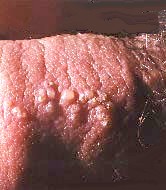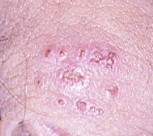|
The information on this page is for educational purposes only, and is not meant to help diagnose or treat disease. For accurate and up-to-date information, see a health professional. Genital herpes is an infection caused by the herpes simplex virus, or HSV. There are two types, and both can cause genital herpes. Type 1 is commonly seen as fever blisters or cold sores, but it also can infect the genital area and produce sores there. Type 2 is the usual cause of genital herpes. A person who has Type 2 genital herpes infection can easily pass or transmit the virus to an uninfected person during sex. The virus is spread only rarely, if at all, by touching objects such as a toilet seat or other common home surfaces. HSV remains in certain nerve cells of the body for life, and can produce symptoms off and on in some infected people. It remains one of the fastest growing infectious diseases in the world in absolute numbers of people. In Canada, about one in seven people carry the herpes virus, and the majority don't know they do.  Most people get genital herpes by having sex with someone who is having a herpes 'outbreak', when HSV is active and causing visible sores in the genital area. These sores shed viruses that can infect another person. Most people get genital herpes by having sex with someone who is having a herpes 'outbreak', when HSV is active and causing visible sores in the genital area. These sores shed viruses that can infect another person. Sometimes, however, a person can have an outbreak and have no visible sores at all. People often get genital herpes by having sexual contact with others who donít know they are infected, or who are having outbreaks of herpes without any sores. Often people who have genital herpes, especially females, donít know it because they seldom have symptoms, or the symptoms they do have are minor and mistaken for something else. Because herpes is a virus, which is a very tiny organism, it spreads very easily with the exchange of body fluids, just like AIDS. Using a condom may not stop its transmission. When there are symptoms, they can be different in each person. Most often, when a person becomes infected with herpes for the first time, the symptoms will appear within 2 to 10 days. These first episodes of symptoms usually last two to three weeks. Early symptoms of a genital herpes outbreak could include:
 Within a few days, sores appear near where the virus has entered the body. They also can occur inside the genital areas of women and men. Small red bumps appear first, develop into blisters, and then become painful open sores. Over several days, the sores become crusty, and then heal without leaving a scar. Within a few days, sores appear near where the virus has entered the body. They also can occur inside the genital areas of women and men. Small red bumps appear first, develop into blisters, and then become painful open sores. Over several days, the sores become crusty, and then heal without leaving a scar.
If you have been infected, you will probably have symptoms or outbreaks from time to time, for the rest of your life. There is no cure for herpes. After the virus has finished being active, it travels to the nerves at the end of the spine where it stays, inactive, until it eventually causes the symptoms to flare up again ... usually several times a year. However, as mentioned, many women with herpes infection have either no symptoms or only a slight discomfort in the genital area. But while the virus is active, they can still infect a partner. After the first outbreak, any future outbreaks are usually mild and last only about a week. Outbreaks may involve a tingling feeling or itching in the genital area, or pain in the buttocks or down the leg. Sometimes, only the tingling and itching are present and no visible sores develop. At other times, blisters appear that may be very small and barely noticeable, or they may break into open sores that crust over and then disappear. The frequency and severity of the recurrent episodes vary greatly. While some people have only one or two outbreaks in a lifetime, others may have several outbreaks a year. The number and pattern of repeat outbreaks often change over time for a person, and are unpredictable. The average untreated person with herpes spends about a month out of the year with obvious lesions; the rest of the time, the disease is hidden. Scientists do not know what causes the virus to become active again.  In some individuals, especially pregnant women, newborn babies, or people with immune system problems, herpes virus infections can be serious, even life-threatening. Complications can include infections in the newborn, sight-threatening eye disease, encephalitis, or lymph cancer, all resulting in severe illness or possibly death. Genital herpes virus is particularly dangerous to pregnant women, as a first-time genital herpes infection during any stage of pregnancy can result in spontaneous abortion, low birth weight infants, and premature delivery. If a pregnant woman contracts herpes during the third trimester of pregnancy, her baby can also develop the disease. In some individuals, especially pregnant women, newborn babies, or people with immune system problems, herpes virus infections can be serious, even life-threatening. Complications can include infections in the newborn, sight-threatening eye disease, encephalitis, or lymph cancer, all resulting in severe illness or possibly death. Genital herpes virus is particularly dangerous to pregnant women, as a first-time genital herpes infection during any stage of pregnancy can result in spontaneous abortion, low birth weight infants, and premature delivery. If a pregnant woman contracts herpes during the third trimester of pregnancy, her baby can also develop the disease.
The horror of herpes virus lies in its resistance to traditional medication, and its tendency to recur again and again. The herpes virus, first detected 200 years ago, is incurable. Once the viral DNA has been transmitted to the receiving personís nerve cells, the infection is permanent. Up to 60% of people who have genital HSV infection show no signs of the disease and are unaware that they are infected. These people are, however, capable of transmitting the virus to others. There are medicines now available which dramatically reduce the seriousness of herpes outbreaks, and also reduce the number of outbreaks. Daily use of these antiviral medicines can prevent or shorten outbreaks. Antiviral medicines also can reduce the chance of spreading it to others. But, as mentioned, no absolute cure for the disease exists, and anyone with herpes can pass on the disease for the rest of their life. What does all of this mean to a high school student? First, a quick summary of the facts:
The only one foolproof way to ensure that you do not get genital herpes is to abstain from sex until you have found the partner you want to spend the rest of your life with. Ideally, before you get married, each of you will get a medical check-up to ensure that neither of you has any sexually transmitted diseases. Unfortunately, people who have casual sex don't know anything about their partner's history, and obviously no medical check-ups are done. That's why herpes and other diseases spread so easily, and why your chances of getting herpes are very high if you are sexually active. You have no idea who has the disease, and they aren't likely to tell you. These are the risks you take if you engage in either protected or unprotected casual sex. Very few people remember the seventeenth time they had sex, but everyone remembers the first time. Consider saving that lasting memory for a partner that you really care about and are ready to spend the rest of your life with!
|